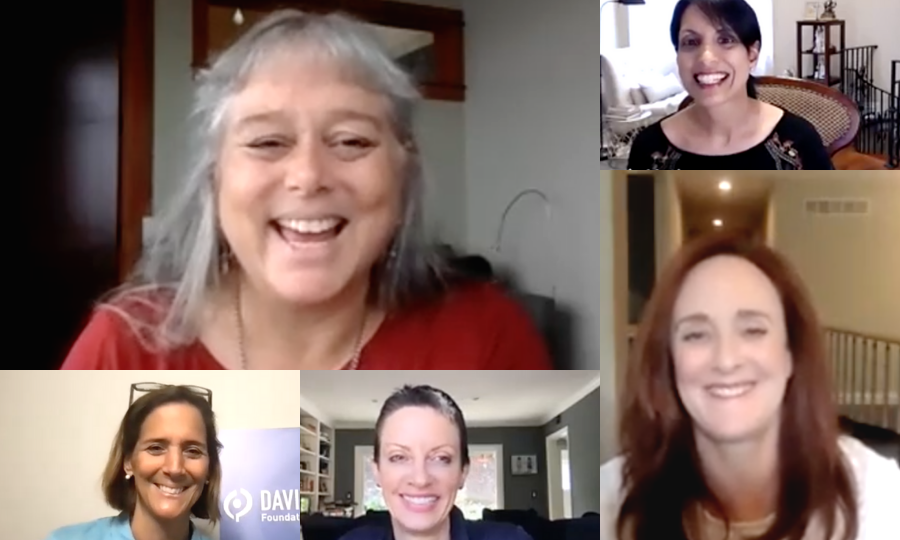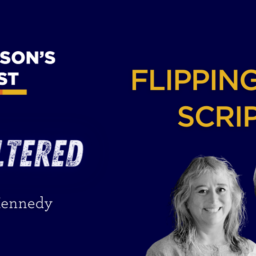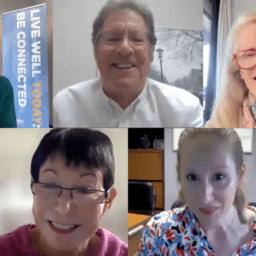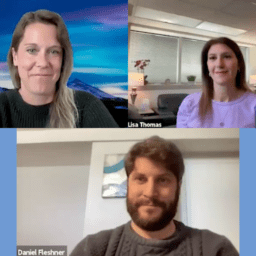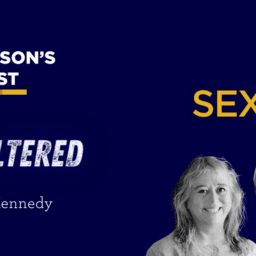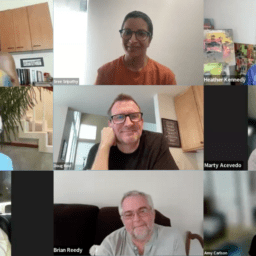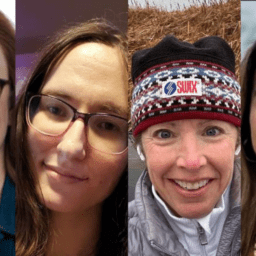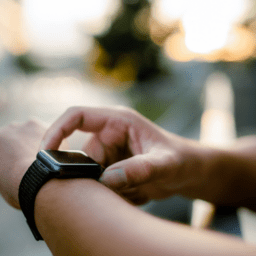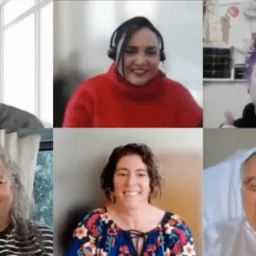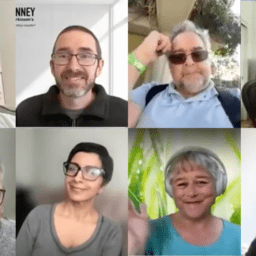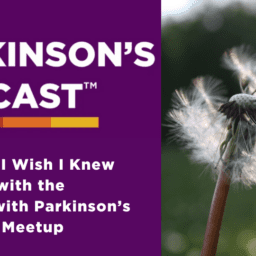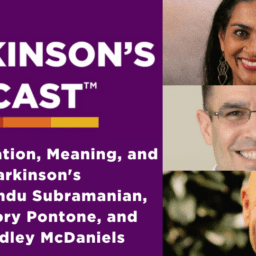Receiving a Parkinson’s diagnosis when you’re young is overwhelming enough. Being a woman with a Parkinson’s diagnosis adds an additional layer of complexities and challenges.
In this panel discussion, the YOPD Women’s Council discusses sex, intimacy, love, dating, and other topics related to relationships.
You can watch the video below.
To download the audio, click here.
You can read the transcript below. To download the transcript, click here.
(Note: This isn’t a perfect transcript, but it’s close.)
Melani Dizon (Director of Education and Research, Davis Phinney Foundation):
We are here for the YOPD Monthly Council. My name is Melani Dizon, I’m the director of research and education here at the Davis Phinney Foundation and I’m here today with Dr. Soania Mathur, Kat Hill, Karen Frank, and Heather Kennedy is going to be joining us any minute. Before we get started today why don’t you guys just go around and say hello and say, why you’re on this panel and then we’ll kind of start out with some polls. So Kat, you want to get started?
Kat Hill (Davis Phinney Foundation Ambassador, YOPD Council Leader, and YOPD Women’s Council Leader):
Sure, good morning, or afternoon, or evening, or wherever you’re dialing in from. I ‘m Kat Hill. I’m in Portland Oregon and let’s see, I have been married for 31 years and I have three kids. So since we’re talking about relationships, I think that that is relevant. Yes, absolutely. Karen?
Karen Frank (Davis Phinney Foundation Ambassador, YOPD Women’s Council Leader):
Yeah. Hi, I’m Karen Frank, I live in St. Louis, Missouri, and I am a retired nurse anesthetist, and I’m on this panel because I’m very interested in young onset Parkinson’s and women’s issues, and I am newly married, I’m in my first year of marriage.
Melani Dizon:
Newlywed. Yes, excellent. Soania?
Soania Mathur, MD (Davis Phinney Foundation Board Member, YOPD Women’s Council Leader):
Hi, everyone I’m Soania Mathur. I have now been married for almost 20 years but been with my husband now for almost 33. We have three children together and I’m so glad to be part of this conversation about relationships I think it’s really important and not spoken about enough.
Melani Dizon:
Okay, so we are waiting for Heather to come on and she’s going to be leading this when she’s able to do that but for now let’s just kind of dive right in. Does anybody want to talk Kat or Soania or Karen about your relationship and how it has changed you know maybe since you were diagnosed to now?
Soania Mathur:
Go ahead, Karen.
Karen Frank:
Okay. Yeah, I was diagnosed, three and a half years ago, and my now husband, we were not married at the time, we had been dating for about five years. We had just moved in together. We had bought a home together, and six months after doing so, and we bought a more expensive home then I was living in, so, six months after doing so I was diagnosed withParkinson’s, and I was no longer working in my chosen field.
And that was a bit of a shock. You know I wasn’t planning for that, at 47 years old. So, initially, I think, you know, my husband, I mean I call them now my husband because we got married in August, but it was dicey at the beginning. I mean I had an an initial period of depression. I think that I was consumed by Parkinson’s.
Welcome Heather.
Kat Hill:
Hi Heather, it’s ok, it happens to us all.
Karen Frank:
But I was consumed by this, this diagnosis, initially, and it really put a lot of strain on the relationship and it took me some time to come through that fog and turn it into something that, that actually was life enhancing and life improving and obviously that happened because we were able to come through and weathered that storm together but I had a very supportive relationship in which to do so and he was quite patient.
So you know we actually did get married three years after my diagnosis, which was wonderful and he continues to be my greatest support, I would say. That was my experience.
Kat Hill:
Soania, you want to take a turn?
Soania Mathur:
Sure. So yeah, as I mentioned I met my husband, when I was just starting university, so we’ve been together for about five years prior to getting married. And then I was diagnosed, probably, I got married really early at 22.
And then I was diagnosed at about 27, 28. So, we’d been together for a number of years prior to my diagnosis. And, as a physician I think he came to sort of an understanding about what this was, like from a physical standpoint, from a physical symptomatology standpoint, but we were still newbies in terms of how to deal with it as a relationship. And, and he’s an extremely understanding person, extremely patient. But I admit that for the first 10 years of my diagnosis I didn’t really accept it myself emotionally, so it was very hard for me to to guide him in terms of what I needed it in the relationship when it came to the Parkinson’s disease.
So he was like, between a rock and a hard place if he was trying to help me, I’d be like, “why do you need help me, I’m not disabled, I just have Parkinson’s I’m not disabled yet.” And if he didn’t try to help me and be like, “why aren’t you helping me, can’t you see I’m having trouble with this,” so poor guy was really stuck, you know, as I said between a rock and a hard place but he persevered, he weathered, and you know I started as I began to emotionally accept it, I began to really see it from his point of view and how it was really difficult for him to also be dealing with this, you know that my, it wasn’t just my Parkinson’s it was his diagnosis as well.
And to be honest, I find that would be actually harder than dealing with it. Personally, I mean I think witness it in someone that you love is a very difficult emotionally thing to accept.
But here we are you know almost 28 years later three kids later and he still continues to be, you know, a very strong strong support for me physically and emotionally, but you know unfortunately I think that maybe is not always the case is I’ve seen sort of, witnessed in the community itself that sometimes these diagnoses, or just that kind of stress can really damage relationships as well.
Heather Kennedy (YOPD Council Leader and YOPD Women’s Council Leader):
One thing I’ve noticed is that the impetus to communicate well is on us. And while we’re making all of our plans like being on time, to a webinar that you’re supposed to moderate, life happens regardless, and the body does what it wants. It’s not exactly a ripe place for romance or things to go really smoothly. So our partners or the people who are around us need to be flexible. And we need to be more communicative. What do you guys think about that idea?
Kat Hill:
Heather I totally, totally agree and I think, Ken and I, my husband and I’ve been married 31 years and we’ve, part of what we’ve learned in our journey is that when the hard stuff is hard, you have to communicate more, and you have to set aside time to do that. We’ve had some challenges as a family with a son who has struggled with some chronic illness and some has been in and out of the hospital quite a bit which has been rather stressful and it, it laid the groundwork well for us to learn how to communicate with one another and carve time to talk about the heart issues. So when my diagnosis came, we already sort of had a framework that we operated in and I couldn’t really break the pattern we had already said even though I was sort of like Soania, I want you to help me, I don’t want you to help me, I’m fine, I’m not fine, I don’t know when I am. But I want you to understand it no matter what I’m doing and and it, it does take special people I think to help partner in this journey, but I think for Ken and I we had laid the groundwork well, and struggled some with doing that, but really learned that we had to talk often, and honestly, and also not in the heat of the moment when I was having that really tough time or my dystonia hurt and I was feeling, I don’t know down or bereft or frustrated. So, I totally agree with everything that’s been stated.
Heather Kennedy:
How do we maintain dignity in our relationships? Soania touched on a very important point. You know, when do we need help? How do we ask for it and how can they tune into that, they can’t read are invisible cue cards.
I mean we have to say, help me with this but not that. Michael J Fox was in a sitcom not so long ago where he was trying to get something off the table, they’re like dad just let us do it because it was taking him so long. And it’s hard to know you know it’s a dance that you do with your partner and Soania you and your husband have worked that out and Karen, you’ve had to, and you know Kat you’ve had to with your partners.
And I think there’s a very good reason why I don’t have a partner. It’s hard. I have much respect for people that stay through it and work it out and communicate.
Melani Dizon:
Can you talk a little bit more about the hard part?
Heather Kennedy:
The hard part? I think, and I’ll just speak for myself, I’ll speak first person because I don’t make any assumptions about anyone with Parkinson’s, relationships as we know are very complex, we’re not just coming with Parkinson’s we’re coming with a life of experience, different upbringing, different everything, maybe different cultures, different religions, we’re blending families things are complicated, people are working, they’re distracted.
There are a million things pulling us out of the moment. And what requires the moment more than love and true and deep intimacy and feeling that bond with another human being, and I’m here to tell you, if you have a chronic illness, you are worthy of this love, you are worthy of finding someone who can fit with you.
And one of the great blessings of dating or being in relationship or whatever. You can find out pretty quickly who has the capacity to allow all your changes, and who doesn’t. It’s just capacity, it doesn’t mean that you’re not lovable if it doesn’t work out. All we can do is communicate, so the hard part for me Mel would be in miscommunications. Yeah. That’s tough.
Melani Dizon:
Does anybody else want to add to that or also, you know, Heather you you brought up the idea of, you know, it’s any relationship right, it’s going to be that person’s capacity to be your friend, to listen to what you’re going through and all of those kinds of things so obviously intimate relationships is one thing but what about just the right just other relationships in your life, how have those changed, how have those grown or, you know, you’ve said goodbye to people because they’re not quite they don’t have that capacity, how’s that worked out for all of you?
Soania Mathur:
I don’t think that I’ve, when I sort of socially disclosed my diagnosis, it took a long time for me to do that because you know I was worried I’d have a pity party and people would all say, “there there” and I was the type of person, and I still am, I’m not the type that likes to hear that.
But I think for me any relationships that fell by the wayside, which were few, but they have, fell not because of their in their incapacity to accept my situation but my hesitation to allow them to show me that capacity.
So I think that’s really where it stems from my situation, I do have very social, very supportive social circle, but I think anytime it kind of, you know, tempered down it was because of me.
Because I think I have to and I still do it you know, with my husband being as supportive as he has been, I have difficulty, asking for help, and showing that vulnerability and allowing him to do things for me I get very irritated.
You know, even with my kids and there’s such loving girls and they want to do the dishes or they, but if I’m struggling, I want to get through it myself and that’s something I’m trying to work on really is allowing somebody to help or allowing them to show, show me that support.
Karen Frank:
I’ll just chime in for a minute. There’s a couple things I wrote down just to remember but I send the benefit of watching my parents deal with my father’s Parkinson’s disease, and he was diagnosed at 51 years old and he died at 74, I believe, and you know my father had made the decision not to disclose his Parkinson’s disease as long as possible so he went about eight years beforehand, he had fears for his financial security and his career and he made my Mother promise that she would not tell anybody that he had Parkinson’s and that put a really large burden, undue burden of isolation on both of them.
And I think, you know, both socially outside the marriage, and within the marriage. My mother’s needs really weren’t being met and she wasn’t communicating her need to have a different sort of approach toward this, and I think the hindsight and the knowledge that I gained from watching that struggle between them, gave me a different approach, I decided from the very beginning that I was going to be open about my Parkinson’s, and with friends and partners alike, and professionally, and that made a big difference for me.
I found that a lot of the people who I had been friends with I worked at a big academic medical center, and I had a very social job. And so when I stepped away professionally, I really had to rebuild a social life for myself and that was key in having a healthy relationship with my husband, because he couldn’t be the only person and the only thing in my life that fed me, you know, I had to find women in particular in my life, to have his friends because I was no longer around a lot of the people that maybe I only saw them at work, but I didn’t realize how important those relationships were in making me feel connected to the world and to humans and just, you know, social in any way.
But one thing that my husband and I did, and we did this out of a need for, we were struggling with our communication, and we were having trouble. He’s a very introverted quiet person and he has trouble asking for what he needs or even sometimes knowing what he needs, and I’m sort of the opposite, very extroverted and always out there but maybe bouncing around, and we made a decision that it was important to practice communicating, so that when difficult subjects came up, we would would have better skill in doing so, so we made a habit that every weekend on usually on a Sunday we would take this time for what we called checking in.
And it was just 20 minutes to bring up anything to one another that may be needed a little discussion and what that allowed us to do is compartmentalize some time to dedicate to those difficult conversations but also to limit it so that it wasn’t all consuming in our relationship all the time, and we knew that we always had that process, that weekly, we were going to take time and we were going to put something on the table to digest and discuss and bounce around, and we could even take the week and think about it, and we knew that next week we could revisit the subject. And we’ve made that habit in our relationship and I think it’s been really really helpful for us to give a platform and a forum to dealing with issues. We don’t let things build up.
You know, they build up for a week or two and then we talk about it and that really has made a difference for us.
Heather Kennedy:
Do you use the imago technique or something like that where you listen, and you repeat back to your partner “what I heard you say was” and allow them to clarify and really empty their cup. Do you do something a little bit like that?
Karen Frank:
Trying to unmute my hands bouncing all over, um, we did try that initially because we went to a therapist together. And, you know, they gave us that kind of formulaic sort of regimented way of communicating but it really was helpful.
And I think what stuck with us is let’s routinely do this, but yeah, I mean we do because what I found is I’m a bit esoteric when it comes to things and I read into things, and you know he’s really straightforward like if you ask him what he’s thinking, and he says nothing like that’s for real.
Well, women are trained to perceive threats on the horizon. Right?
Melani Dizon:
Karen really quickly. I’m just, you know, for real practical purposes you said I needed. I needed new friends I needed people to hang out with what did you do?
Karen Frank:
Um, I joined a health and wellness center and I started taking exercise classes and meditation classes and I started volunteering and I got hobbies and I started reaching out to people who I, I think I learned this in a to be of service to other people and that that to me was really important so if somebody came new to boxing and they were 38 years old and had just been diagnosed with Parkinson’s, I was the first person to go up to them and put my hand out and say can I take you to lunch or can we talk on the phone and I found that, you know, by putting myself out there it engaged me in the community and I was able to make new friends, and you know one of my most cherished friendships that’s come out of this last couple of years is with a 72 year old woman and we have an intergenerational friendship and at a time when my mother who’s suffering from Alzheimer’s disease and has kind of like shrunk away as that role model and figure in my life, my friend Lucy has stepped in and at the same time, you know I’ve become more like a daughter to her.
So that’s been a really interesting experience in relationship, and you know she lost her husband to cancer about 12 years ago, and you know me having a new adult relationship I mean it’s just been a friendship like none other than I’ve ever had. And so that came from, really, I was taking a neuroplasticity class at this exercise place, and she wanted to stay sharp as she was aging, and I had been diagnosed with Parkinson’s and now she’s my walk buddy and my partner in crime when we go out to restaurants before the pandemic anyway. And that’s been great.
Kat Hill:
I thought I’d jump into a little bit like Karen I left my, my career with my diagnosis and left a lot of my peer group and and so I started, I took some classes also, I took an art class which has been really valuable I have met a lot of people through that kind of, like, they call themselves my older sisters, because it’s not quite, they’re close to my closer to my mom’s age than my age, but I’ve learned a lot from them and we enjoy painting together and we do some travel together which is really nice.
And I also learned, sort of, some of the things that Soania was saying about, I also found that I had less energy than I used to with Parkinson’s, and so to maintain all the friendships, I actually gave myself permission to kind of make a list of people and relationships that I really wanted to reserve time for and to nurture and to maybe let go of some of the relationships that didn’t feed me as much that felt draining or, and not just saying yes to say yes to fill up my time, I wanted to have richness and meaning and reciprocal friendship so that that helped me. My husband would often say, what are you up to today and I’d say well I’m doing this or doing this and seeing this person and he’s like are they on the list?
And so it was good perception check for me to not fill my calendar, just to fill my calendar. So that’s a tip that might be helpful for some of you if you’re feeling overwhelmed with who to spend time with so.
Heather Kennedy:
Kat you bring up such a good point about meaningful relationships. When you ask people are lonely, they’re not lonely for lack of being around other humans usually. It’s the depth of connection, it’s the meaning, it’s the purposeful conversations.
I mean I can go to any club in San Francisco and dance all night with some kids that are probably on alphabet drugs if I want, or I can go to the theater, I can go anywhere. But if I don’t have a comrade or somebody with me, who can mirror back and say I hear you, even if they don’t agree or whatever, just another person there. And so many people with chronic diseases live increasingly isolated lives. And it’s literally killing us.
So it is organizations like Davis Phinney. Here’s my plug, my ham-handed plug, that have made my life so much better. I do not know what I would do without this, access to this. I mean, look at all the offerings. You talk a lot about relationships, Davis and Connie have talked about their relationship. And not only being in relationship being in relationship while being in the spotlight, you know.
And so what we need to do is continue bonding like is having these conversations, these interactive webinars. Help.
Kat Hill:
I think it’s important to have a community that you feel like you can share some of the Parkinson’s part with too. And not just relying on, like for me, not to just rely on Ken, to talk through all the parts about Parkinson’s with, I try hard to certainly keep him informed and share what I’m doing, but sometimes when I feel complainy, or painful, I might reach out to one of my Parkinson’s friends so that it’s not so hard for him to hear also so, I think the network is so vital and I think organizations like Davis Phinney and there are others out there depending on you know there’s Facebook groups there’s chat groups there’s ways to get involved, even if you don’t want to share a spotlight and talk about your marriage and sex life on a webinar. There are other ways to reach out and get to know people as well.
Soania Mathur:
The relationships I agree Kat are very different. When you meet someone that’s gone through going through the same life experiences you, you kind of cut through all the kind of, you know, formal formalities of meeting someone you can kind of just get right down to business so to speak.
They understand what you’re saying you know if I say to you, Kat I’m OFF today, you understand immediately what that means, I don’t have to explain it to you. I feel understood and then I can bitch and complain all I want, and I know you’re not gonna, you’re not going to get tired of it because you understand, you’ve been there, and I would do the same for you know any of you as well. So I think those relationships are really special and you know I know people balk when we talk about the blessings of this disease but really, I must say that the relationships in the community that I’ve built because of my Parkinson’s, people that you know I would never had the opportunity to meet. You know one of my closest friends and mentors is an 82-year-old gentleman, but he’s, you know, someone that I love to spend time with, and you know it’s it’s just strange how these things come about and yes, this disease sucks but there are some really tangible blessings that I received from it and one is definitely the Parkinson’s community.
Melani Dizon:
Yeah, you have you have a shorthand with each other, right, it’s just immediate. I’m wondering about, I think Kat you were talking about it, excuse me, do you have situations, or have you experienced situations where Parkinson’s is just like it seems like every time you’re with your partner it’s about Parkinson’s and you have to be like okay, this is actually a Parkinson’s free zone we’re not doing that. What sort of, what do you do besides like going in and finding someone else to talk to, to, kind of, nurture that in your partner to be like okay yes like this is a lot, you know, what do you do?
Kat Hill:
So I’ll jump in quickly but then I want to. I’m sure everybody has some great ideas. You know, sometimes I’ll say, I just don’t want to talk about Parkinson’s. I’ve had a big Parkinson’s day. And that doesn’t mean it’s a bad day, but I don’t even want to talk about it. I also have told both my husband and my adult children that if they have questions, I want them to ask them directly. I don’t want them to be worried about it, and I will answer them directly, but that I do not want the focus of my contact to be how is your Parkinson’s. I don’t see my son and say how is, how is your diabetes, or my daughter, how is that, you know, static cling going or how are the braces or, you know, we view each other as humans first and and challenges maybe second.
So that helps. I’ve been really frank with my social group. I don’t want you to ask me every five seconds how I am. I don’t want to be defined by this disease, so help me not be defined by it.
Melani Dizon:
I think that is super important.
How, so they know that now, but your non-Parkinson’s community and friends. How did you how did you teach them that, how did you say like, hey, when you see my hand shaking, don’t ask me about it or like, you know what was the educational piece of that?
Kat Hill:
I sent an email to all of my closest friends and family when I was first diagnosed and said, I promise to be honest if you have questions, but I don’t want to be asked that, I do not want that the first thing to be out of our mouths when we see each other.
And I don’t want you to worry because I promise to share if there’s big stuff going on. So, A, I give them permission to ask questions specifically and secondly, giving them the language to say, listen, this is, it’s not going to work for me to keep up a relationship where all we talk about is my Parkinson’s. So, please ask me directly if you have a question, but don’t ask me every five minutes, how is the Parkinson’s? Does that make sense?
Heather Kennedy:
Or how about you seem better? So does anyone here use humor to teach our friends and to learn? I mean I like to wait till my brother’s way across the room and say, hey, do they let you within 50 feet of the schools now? Did you get that cream for that thing you got going on?
You know like joke with him about whatever he’s got going on. And I don’t mind it when I mocked, they’ll be like, Hey Kennedy, and I’ll be like yeah, they’re like you don’t need Botox do you? I’m like no, not in my face, maybe my feet.
So it’s like we like to tease each other and that is welcomed. It makes it like that punch in the arm that little nugget that you give your friend when you’re younger, it’s not so heavy that way. For me. I don’t think everyone can handle that amount of humor. I don’t know but it helps lighten the mood, you know.
Soania Mathur:
I love to wait until someone says, so what’s shakin? And I’m like, uhhh, let me tell you. And I also think it’s also the way you, the vibes you give off, you know, if you are all about other things other than your Parkinson’s as well when you get together with your social circle. The questions aren’t as fast and furious.
And you know when it comes to my husband, we’ve always kind of visualized it like Parkinson’s is in a box so we kind of put it on a shelf and it stays there until we need to talk about it again.
So ours is never, we had quite a long-time relationship before I got diagnosed and that sort of continued. We were a lot more than my husband and his Parkinsonian and wife, you know, a couple for a lot of years and had a relationship built on a lot more things in this disease.
Heather Kennedy:
And you’re both doctors, right? I mean you were working, or you have been working all along?
Soania Mathur:
Yeah, I worked for about 12 years after my diagnosis, and he still is still working. Yeah.
Kat Hill:
I also think for our immediate family and the people that we live with, or we spend a lot of time with sharing that. In terms of the help part, you know, people want to help, and I’ve been guilty of this myself with other people because it’s so automatic to try to help that I promise to ask for help when I’m ready and that’s what I’m trying to learn I’m trying to learn to be graceful with that. It’s not always easy for me to do, but that gives people permission to not jump in.
And so I may be shuffling a little bit, having trouble on a stair, but they if they remember that I promised to ask if I’m struggling, that gives me my power to ask or not ask and them the freedom to not offer.
So it’s sort of laying the groundwork for how you want to be communicated with, and then in the midst of that Sonia also the way and Karen we were talking about like, I want that mental telepathy also a little bit with my husband, but I don’t expect that from my friends, you know, I have to get better at asking.
Heather Kennedy:
What is your greatest challenge in your relationships? That’s part one of the question, the second question is for Mel and Jackie and Leigh… Observing people with Parkinson’s, as closely as you do, what do you see as the main difference in the relationships, so I’ll let you guys think about that, but the first part is for everybody, the first part of the question like what is your main challenge in relationship or something, you find challenging.
That means the audience too, feel free to answer.
Karen Frank: Well, I’ll chime in.
The greatest challenge for me has come more from middle age and perimenopause I think relationship wise. I’m just going to bring up the topic of sex here, because it’s a difficult topic to talk about, I did it. Okay. No, I think that, as I’ve gotten older, and I’ve gained weight in the last four or five years I’ve probably gone from a size two to a size 12, um, you know my metabolisms changed my body’s changed I’m in menopause now I’m not as excited all the time you know, and the Parkinson’s on top of it I think sometimes in the evening I have symptoms you know, I’m not moving well or I have cramps or any number of things that could be going on, and you know also we’ve been together eight years now in a relationship and I think the dynamics after you’ve been with someone for a while change as well.
And to me, you know, keeping it fresh and exciting and aging well in terms of growing together in a relationship and having your physical intimacy grow and change over time. I mean I’m not 29 years old I don’t look like I’m 29 years old I don’t act like I’m 29 years old anymore, and that can be a good thing.
God, thank God. Yeah, but it can also, it can also be a bad thing but when one thing my husband and I did the other night, it was really fun. We have a swimming pool, which has been really a lot of fun because we have a new house and at night, and we have three acres we have privacy in the backyard and, you know, no one can see in the backyard so you know we go in and pull and we swim around and we dance and, you know, we put music on out there, and that’s like our time just to be goofy and creative and it’s our own little private space and that’s something we never would have done before. And now, you know, we have just our intimacy and the way we interact with one another has changed a lot, and matured, you know, and I’m enjoying that, growing into that.
So that’s been a challenge.
Kat Hill:
Yeah, Karen, I think that’s a really awesome point, that, that there’s more to intimacy than sex, right? So intimacy is a broader aspect of a relationship and I think over time, you know, our partners are also aging, my husband, as perfect as he is if you’ve met him, is not the same as he was at, at when you know we were married at 23 and 25 so we were fairly young and have, you know, we’ve both aged and changed, but I think part of it is that we also talk about it, that is, you know, checking in, this is different for me, this is harder for me this, you know, the times of day, you know you said the evening we’ve gotten more creative earlier in the day when I have a little bit more energy especially now that he’s working at home, that’s given us some freedom to, to talk about timing for me that may be better.
And we talk about who’s going to initiate and and what that looks like and, and is, is this enough for you, are you feeling and and looking at intimacy broadly. Skinny dipping in a pool is awesome we take a hot bath together sometimes or get in the shower together, we, you know, and having the children out of the house has helped also. At the moment we don’t have any kids at home.
It may change tomorrow but I think keeping the communication going, making it playful, accepting that our bodies are different and telling him that I love him a lot. You know, often. And sometimes that’s, that’s enough for intimacy for a day.
Heather Kennedy:
You’re melting my cold dark heart over there. You two cuties.
I would say to that. I just want to add to this whole course, there’s something really nice about staring into each other’s eyes, just gazing, just stopping, maybe putting your hand on each other’s heart, and feeling that breathing. It’s just so deeply human we don’t get enough of that in our rushing, necessarily, I don’t, I don’t know a lot of people who do. So I like what you’re saying Kat about just taking time taking a bath watching TV holding hands walking together.
And this can also be done non-sexually with a friend. We need it.
Thank you for saying all that Kat and Mel, back to you guys about the question. What do you notice, the main differences like observing people with Parkinson’s so closely as you’re having working with us and helping us as you have?
Melani Dizon:
So, do you mean how I observe your relationships with other people or my relationships with people with Parkinson’s, our relationships with other people like what you see when you look in?
Yeah. Oh, gosh, priority. I feel like that is the big message that I see is that, you know, it’s, an urgency to put the right people in your life.
And to not have the wrong people. And a lot of people don’t get that till they get older, right, they, they decide when they’re 50, 60, 70, I don’t even time for that anymore.
You don’t have time for that immediately. And I think that’s a really, that’s a great, great lesson for people to learn. There’s just so many good people in the world why spend any time with people who are not.
Heather Kennedy:
Absolutely. I leaned into a millennial yesterday and I said, I’m 50, I’m old. She’s like do you old people still have sex? I’m like, what is this thing called sex. We were sort of teasing each other but I thought, you know as we do get older, we lose people just by happenstance and life things and people move on and, you know, it happens naturally anyway.
So there is that quieting, the isolation, with or without a chronic condition, and to stay connected as we do and to prioritize as you say, is the key. You just nailed it, Mel.
Melani Dizon:
So, yeah, Leigh says all the advice you have given about relationships and communicating is something everyone needs to hear you are amazing communicators. Yes, I mean, it is like the the blessing that you want to say gosh could everybody have a real problem, like a real real big like chronic thing that they’re going to go through so that they can learn all of these things.
Unfortunately, we do things that are just the side of torturous until some real change happens right. And when, whether it’s you know, maybe watch somebody die, and then everything comes really close to you die, everything changes and you get a new perspective and you spend time on the things that are more important, you get a Parkinson’s diagnosis, you do the same thing.
But you see a lot of people going through life like willing to accept, less than great relationships and experiences, and for whatever reason don’t have that urgency to get rid of them.
Kat Hill:
You know, and I do think chronic illness in a partner or a child, is a test of a relationship. And I think that part of what made it easier for Ken and I was that we had weathered a lot of those challenges. We had weathered alcoholism, we had weathered a chronically ill kiddo, we had weathered getting a child in the mail. There have been a lot of challenges that we weathered and points in our relationship where we could have walked away.
And it laid more solid foundation working through it. And I think that it took a real love and a commitment. We had had a long relationship, I mean I was 21 when we met, you know of course I’m only 31 now so I don’t know how it’s been possible to be married all this time, but, you know, you just you weather it together or you don’t. And I think I’ve heard of a lot of relationships that haven’t weathered it and I think it’s not the right person then right and I don’t know Heather, what do you think about that because I am curious about how you manage?
Heather Kennedy:
Well dating is going really well.
Melani Dizon:
Yes, I really want to talk about that, and people want to hear about it.
Heather Kennedy:
So I’m just kidding, I’m really not dating because, what a nightmare my dating experiences were. Oh my goodness do I have stories for you all, someday. Anyway, what I want to say is that it’s very hard to date with Parkinson’s because one, when do you disclose? Two, could you even hide it if you wanted to? Three, how soon do you tell them that you might not be able to control your facial expressions or you’re twitching or something’s happening that doesn’t seem quite okay. And they might get to the point where they say what is wrong with you, you know, and then this whole other discussion starts.
Or they might say, oh, you have Parkinson’s, so what? That’s a nice place to start from.
And honestly if I didn’t have Parkinson’s. I don’t know that I would go online and connect with someone with Parkinson’s. So let me be clear here it’s not like, you know, and it’s not because I think that they wouldn’t have loved to offer, I wouldn’t have understood it.
So education and and you know I refer this book a lot this Disability Visibility because it normalizes our experiences a little more. We’re not like that song creep where I’m the weirdo, what am I doing here, I don’t belong here. We do belong.
And this integration. And, for example, I’m just going to start going off on a tangent here, but I’ll be quick. I went out yesterday when I was extremely often being programmed right now, I don’t know if you can see I’m really twitchy I can’t control myself very well, I’m being programmed with DBS I had DBS earlier.
And I went out and I found the nearest open microphone. And I sang something that I’ve never sang before because I was OFF. And I was shaking, and everyone was sort of looking a little horrified the kids in the place seemed almost scared, so I did mention, I’m not nervous I have Parkinson’s. I blurted that out into the microphone too. But I think them seeing that was great, because then they could see 20, 30 minutes later when the medS sort of, my heart rate came down, I could breathe with my solar plexus again.
Everything sort of normalized. So I think what I’m getting at here is wait it out. Be patient, I know I’m not patient, but be patient with your dating or with your loved ones, or with your love life, just wait it out.
You know and go ahead and sing that wonky song. Come as you are. You want them to love you as you are, anyway, why bother pretending. You know, so just wait it out. Yeah.
What do you guys do when you’re OFF? Like let’s say that you’re with your loved one you’re off on a date and you’re OFF.
Kat Hill:
I come back to the honesty piece. It is what it is.
Soania Mathur:
Absolutely, I mean, my children have only known me since I’ve had Parkinson’s and my husband’s been living with it as long as I have been, so they’re sort of used to it, you know they they kind of know what to do, go get mama’s meds or you know whatever I need. So they’re kind of been trained by life experience in order to, to help that.
Kat Hill:
Soania when you go out, I’m curious, do you take, I often will take a backup thing to do, if I need to park myself, and while my family’s doing other things so that I don’t have to leave like, I’ll take a book, or do you do that like plan backup?
Soania Mathur:
I don’t plan for backup because I don’t want to have to do backup. I have FOMO when it comes to social things. I want to do what they’re doing, and I want to be with them as much as I can and that comes to priorities again right I just don’t want to miss out on any kind of experiences that they’re going through. You know, smartphones are helpful that way, if I get stuck somewhere and I need you know 15, 20 minutes for meds to kick in, you know, I just take it easy.
Melani Dizon:
Heather, when you were talking about, you didn’t want to date but when you were dating more, did you have people say, when you were like, well I have Parkinson’s, and they’re like so what, great. Did you have that, did you have both experiences?
Heather Kennedy:
Yes, and full disclosure, I have dated both women and men, surprise! I have a couple kids you know I was married.
And I do find something very interesting and non-binary people as well I don’t want to leave anybody out here, you know, in the political correctness part especially because all people are deserving the same space here. But anyway, what I did find was that generally speaking, the women were much more like, I don’t care. The guys disappeared.
But that was just my experience, and the funniest date I ever went on was with a surfer guy, musician, and that was the one where I could not wait to get to the bathroom.
And I get to the BART station, and I run to the door, and it’s locked of course, right, what BART station bathroom is open. And so I go running out to the bushes. And right as I start to relieve myself, all the lights came on in the parking lot of all the people that were ascending from BART, and that date went well.
So there’s that kind of thing, where you’re like, oh, I can’t believe this just happened. I’m humiliated and embarrassed. You see the person out you’re like, you know, you’re done.
So dating can be awkward, you have to have a lot of swagger, a lot of confidence, you have to find people who are confident enough to be flexible. They can’t really care too much about people think they’re gonna hang out with someone like me, you know it’s not going to be on their on their list of high things like be always appropriate because what’s appropriate about Parkinson’s?
What do you guys think about those uncomfortable moments that you have, like with friends or with anybody? Can you think of something, like Karen, I’m sure you can think of something where you were out of your element? You know.
Karen Frank:
I usually just make a joke out of it. You know, I don’t know. This is pretty funny. This is funny. I was at a party with my husband and his boss was there. And we were having a game night, and I was a little bit OFF, and I wasn’t moving, you know how I usually move, and we were playing some game where you had to like act it out. It wasn’t Pictionary but it was like Telestrations or something, and I was supposed to pretend I was a plumber.
And so I decided I would turn around, I won’t do it here, but I turned around and kind of leaned over and I was pointing to the plumbers crack, you know, and I pulled my pants down like a quarter of an inch to show the top of a plumber’s crack, and my hand slipped because I wasn’t moving right I mooned my husband’s boss, and everybody jokes about it to this day and it was hilarious, I’m like Parkinson’s moment.
And, yeah, that was awkward, but it’s still a funny story that we talk about to this day, and I hadn’t a game night since the pandemic started until just recently, and we just got together again for the first time since the pandemic with a few friends, including his boss and his boss’s wife and I was like I’m not gonna, no replays of mooning the boss. But we still laugh about it, but that was Parkinson’s I didn’t mean to do that, and it was a little…
Heather Kennedy:
But what did they guess that you were?
Karen Frank:
Nothing, not a plumber.
Heather Kennedy:
I love those life moments where we are able to laugh at ourselves.
Melani Dizon:
It’s so helpful for everyone else in the room who doesn’t have Parkinson’s just say, oh, that is this really funny, right?
Heather Kennedy:
Like I’ll make you look like a Rockstar.
Melani Dizon:
Yeah, this is your life with Parkinson’s, it’s not going away. Why not just be like, oh, this is what it is. Right?
Heather Kennedy:
Yeah, why not moon your husband’s boss.
Melani Dizon:
Yeah. So, before we like to start to wrap it up, is there anybody in the audience watching that has a question or a topic they wish that we would have covered that we have not yet. If so, feel free to put it in there.
Heather Kennedy:
(Singing) “Let’s talk about sex baby, let’s talk about you and me. Let’s talk about,” okay… here’s the thing. Pleasure is our birthright. Have fun. Nobody moves nobody get hurt.
You know, just have an adult conversation about it. The blessing of getting older as we kind of know what we want.
Kat Hill:
I also would like to add that, there are medicines that can impact our ability to enjoy or get aroused as we used to be able to and I think in my practice I talked to women a lot about sex and about pleasure, and I think that there are, if you’re comfortable talking about it with your partner there are ways to achieve climax and use lubrication and toys, and I want to give people permission to explore their own sexuality a little bit.
And it may take it may take getting creative a little bit, so don’t be afraid to talk about that, if that’s impairing your ability to enjoy sex. So, and if you’re not comfortable talking to your partner, talk to your provider about it, or reach out to me, I’d be happy to talk about it. I it’s an important part of who we are as humans, and it’s important in our relationships so don’t go without, don’t think it’s just you, there’s a lot of us that struggle with those things and and there’s some ways to overcome it and still enjoy sexual pleasure as well.
Melani Dizon:
Thank you, thank you for that Kat. Well, thanks everybody for being here today and talking about this and talking about it so openly. I know it’s so helpful for people and all the really practical tips you provided is great. If you have any question at all you can always email us at blog@dpf.org. Otherwise, we’ll see you next month.
Show Notes
- Communication is key to healthy relationships, especially when you’re living with Parkinson’s. A few tips from our Council on building effective communication in your relationship include:
- If you have not yet emotionally accepted your diagnosis, it may be difficult to establish healthy communication with your partner about your Parkinson’s. Once you have processed your diagnosis in your own way, you can begin to communicate clearly your needs and wants as they relate to your Parkinson’s
- Communicate clearly your expectations and preferences when it comes to asking for and receiving help. When Davis Phinney Foundation Ambassador Kat Hill was first diagnosed, she wrote all of her loved ones an email that stated she would ask for help when she needed it. As she says,
“That gives me my power to ask or not ask and them the freedom to not offer.”
- All the panelists agree that since receiving their Parkinson’s diagnoses, they understand the importance of having the right relationships in their lives. Not everyone in your life will have the capacity to support you in your journey with Parkinson’s, and it’s okay to let those relationships go
- As the intimate relationship between you and your partner changes because of aging, Parkinson’s symptoms, and/or other life changes, continue to communicate openly about your needs, get creative, and explore intimacy in new ways. If you are uncomfortable talking to your partner about these issues, speak with your doctor or a licensed sex therapist, who can offer suggestions or medications to help
- Relationships, in general, are hugely important in living well with Parkinson’s. They help you to feel supported and connected and help decrease anxiety and depression. In addition, developing a social circle and leaning on people other than just your partner can be beneficial for the health of your relationship. So, how can you build these relationships? Join (or start!) a support group, explore Parkinson’s workout classes, or meet up with a Davis Phinney Foundation Ambassador
additional resources
Intimacy and Parkinson’s with Sheila Silver
Maintaining Relationships with Davis Phinney
Social Capital and the Value of Relationships in Parkinson’s
Intimacy and Parkinson’s with Susan Imke
YOPD Women’s Council: Menstruation, Menopause, Hormones, and Parkinson’s
5 Reasons to Join or Start a Women’s Support Group
Want to hear more from the YOPD Women’s Council?
You can find all of our YOPD Women’s Council recordings here.


